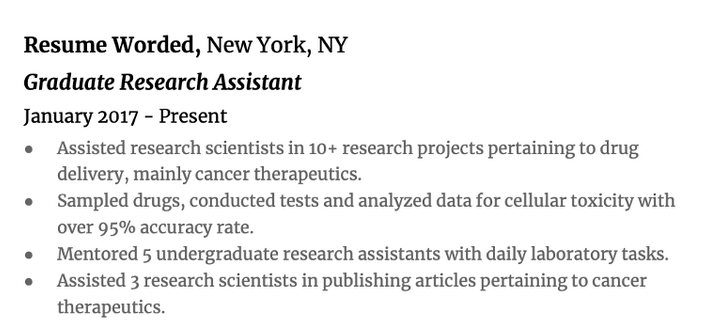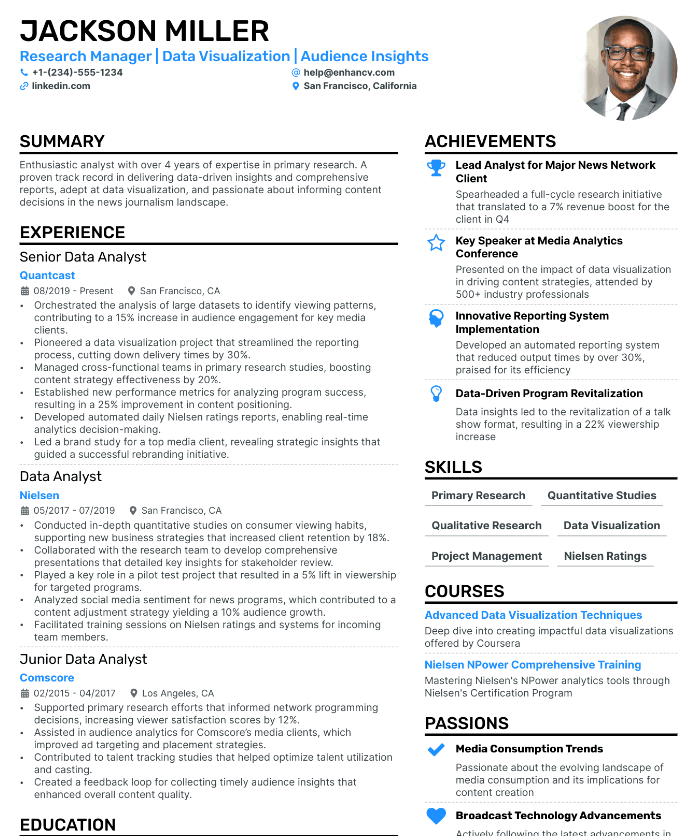Powerful Research Skills CV: Tips

Image courtesy of https://unsplash.com/photos/woman-holding-book-on-bookshelves-GnY_mW1Q6Xc
Strong scholar talents are in demand across a variety of professions. From survey associates and university professors to marketers, data analysts and journalists, enumerating investigation expertise on a profile can fast-forward your way to the dream vocation.
| Topics | Details |
|---|---|
| Data analysis | details... |
| Academic writing | details... |
| Attention to detail | details... |
| Research methodologies | details... |
| Software capacities | details... |
| Critical thinking | details... |
| Time management | details... |
| Communication talents | details... |
In this guide, you'll find:
- what makes scientific acumen important in today's workplace,
- top study expertise for every profession, and
- how to introduce fellow acumen and research-related accomplishments on your portfolio today.
Want a powerful research CV that sells you to employers? Our experts are here to assist you. At ResumePerk, you can order a professional profile for academic study, graduate school, and any other role. We will spotlight your investigation abilities and experience, emphasize achievements, and use a recruiter-friendly format that gets you noticed.
What are scholar competencies?
Scientific expertise are the ability to find, analyze, and evaluate information, and also communicate it to others effectively. Whether you work on investigation projects in the laboratory, write a dissertation, conduct competitor analysis, or write a report for management, you utilize various study proficiences.
A variety of professions in academia, healthcare, technology, marketing, journalism, and more requires examination capacities. These abilities aid companies stay on top of current trends, analyze information effectively, and move ahead. Even if you don't work in academia or as a scientist, advanced investigation acumen makes you competitive in the employment market and develop in your profession.
The term "fellow acumen" is closely connected to such aptitudes as critical thinking, attention to detail, willingness to learn, and many more.
Top 7 survey proficiences for your CV
Here are the specific soft and technical qualifications that are nice to have on your profile to prove that you're a great scientist:
Data analysis
Advanced analytical proficiences aid you to collect information, study and interpret it, and draw logical conclusions. Whether you analyze competitors, consumer behavior, costs, financial trends, or project viability, you can confidently state in your portfolio that you possess data analysis abilities.
For fellow positions, this competence is foundational. It also includes such methods as testing of hypotheses, regression analysis, and proficiency in R and Python. If you have any data visualization capacities, mention them as well.
Academic writing
Required for most survey positions, academic writing aptitudes is essential to present investigaiton findings. It means that you can generate reports, visualize data using graphs and charts, and prepare study publications for scientific journals. It also shows that you have the needed technical expertise and can use professional jargon appropriately and convincingly.
To showcase academic writing proficiences, attaching examples of your academic publications is useful, such as articles, thesis, reports, and more.
Attention to detail
Attention to detail is a valuable soft ability. It shows that you can gather and interpret data, draw meaningful connections, and deliver high-quality work. In exploration, attention to detail also helps you minimize errors and ensure accurate critical analysis.
Hiring managers seek candidates who not only possess the right technical abilities and degree, but are also detail-driven and meticulous in their work, as it affects the organization's efficiency in the long run. Plus, keen attention to detail helps you develop your scholar qualifications better.
Research methodologies
Study methodology is the technique and procedure you use to analyze data. Popular methodologies include literature review, qualitative and quantitative analysis, focus groups, applied study, and case studies. They reflect the overall strategy of your examination and influence the efficiency of your research.
To give the hiring managers an insight into how you work, show how you analyzed data for your previous projects. Explain the methodologies and software you used and the result you achieved.
Software competencies
Present the software proficiences you used in each survey project. Many occupation descriptions require proficiency with certain software to collect and interpret data. Without these qualifications, you won't be considered for the position.
Here are some popular software proficiences for scholars:
- Python
- R
- C#
- SQL
- Microsoft Excel
- spreadsheets
- database management
- statistical programming
- machine learning
Critical thinking
Critical thinking acumen stand for the ability to think outside the box, solve problems, question assumptions, and make well-informed decisions. This skill helps you make judgments without bias and come up with innovative decisions, which is essential for a scholar in any industry.
Time management
Time management is a valuable ability for any job involving investigation. It means that you can manage time effectively, break large projects into easy-to-manage tasks, and prioritize your workload. Strong time management abilities help you set measurable and achievable goals, and therefore get more things done on time.
Plus, proper time management helps you stay focused and effective in your work, which helps you achieve tangible outcomes. To showcase this compatence, explain how you used time-management strategies when writing a dissertation, conducting experiments, or performing statistical analysis.
Communication competencies
The ability to communicate your findings to others, including the non-technical audience, is crucial for every scholar. Also, strong study proficiences help you communicate with coworkers on your projects, explain survey procedures to study participants, and communicate the importance of your examination to a broad audience.
How to list research acumen on a resume?
Now that you know what exact aptitudes to feature on your CV, let's look at how to display them:
Add them to your Summary section
The profile summary section is the first thing the recruiter sees. Thus, feature relevant qualifications in study if they are essential for your target job. Mention the type of investigation you worked on, type of data analyzed, and tangible outcomes to illustrate your capacities.
Keep this portfolio section to 3-4 sentences. Focus on the most important aptitudes that are sure to grasp the reader's attention and inspire them to read more.
Example:
- Meticulous Study Analyst with 3+ years of experience in primary survey for media companies. Experienced at delivering data-driven insights, drafting comprehensive reports, and visualizing data effectively. Achieved an 8% increase in revenue for clients by analyzing the content strategy efficiency.
Create the Key Skills section
41% of recruiters look at CV abilities in the first place. Thus, featuring the right scholar capacities may increase your chances for the job.
To make your qualifications visible, add this section after the vita summary. Include 10-15 capacities that highlight your scholar abilities. Make sure to feature both hard and soft aptitudes, as well as software competencies.
If you're an experienced examinaer with lots of proficiences under your belt, break them into categories for better readability, for example, programming languages, study methodologies, management capacities, etc.
Examples of scholar talents for a profile:
- Academic writing
- Problem-solving
- Data analysis
- Qualitative research
- Primary research
- Data visualization
- Project management
- Competitive analysis
- MS Excel
- Communication abilities
- Multitasking
- Proofreading
Showcase scholar experience
In addition to offerring competencies, feature specific investigation projects you worked. Create a Work Experience section, or Research Experience to list survey projects separately.
For each study position, include the clear job title, company or lab name, and dates of employment. Next, highlight scholar experience using the APR (action-problem-result) method. Describe the actions you took to handle specific problems or challenges, and the result you achieved. If possible, add numbers and percentages to illustrate your impact.
Here is an example for a scholar graduate position:

More ways to list scholar proficiences
In addition to listing study experience and competencies, use these ways to showcase your investigaiton capabilities:
- Introduce it in your education section. If you're a recent graduate, feature study projects in your university. Describe them as real jobs, listing your responsibilities and exploration outcomes. It will showcase your experience and knowledge of the particular field you want to work in.
- Add the Publications section. If you're an experienced scholar and want to work in academia or study position, show examples of previous publications. Thus, you'll prove academic writing abilities and demonstrate your field expertise.
- List continued education. If you took training in data analysis, visualization, or programming languages, add them to your Curriculum Vitae. This will add credibility to your competencies and show your commitment to professional development.
Scientific acumen CV example
Here is an example of Curriculum Vitae you can use for your inspiration:

Why is this a good resume?
- This example presents scientific experience persuasively, showcasing the scope of work done and results achieved.
- The CV is formatted effectively with clearly divided sections and responsibilities listed in bullet points for readability.
- It leads with the Achievements section where the candidate lists their most prominent accomplishments to potential employers.
- The document features the Skills section, relevant education, and training.
Are you a marketing professional? Learn what proficiences to include on your resume to increase your chances for a dream job.
How to list competencies on your Curriculum Vitae?
To make the most of your proficiences, here are some guidelines to follow when listing them on a profile:
Follow the job listing
Before you add any capacity to your portfolio, analyze the job description for keywords and requirements. Highlight abilities and competencies that appear frequently, and then incorporate them into your CV. Mirror the language from the job listing - it will help you pass the ATS (applicant tracking system) that scans profiles for specific keywords.
Use the most important capacities early on your Curriculum Vitae, in your Summary or Skills section. Thus, you are likely to get a higher ATS score, which means more consideration from the employer.
Make sure to adapt the document for each job posting to keep it personalized and address the needs of each particular company.
Speak through examples
It is not enough to add "scientific acumen" to your Skills section and call it a day. Make sure to specify where and when you used these competencies to add context.
For example, if you added data analysis as a capacity, expand on it in the Experience section. Describe what projects you worked on, how you analyzed data, and how it helped study/business outcomes. Quantify results using numbers and percentages for the best impact.
Showing examples is particularly important for soft capacities, such as communication and problem-solving. Since they are hard to measure, giving examples will help potential employers evaluate your competencies better.
Use powerful action verbs
When listing your scholar experience, use powerful verbs to highlight your impact and contribution. Words like Designed, Initiated, Investigated, or Scoured show that you took the initiative during the project and impacted its bottom line. Plus, with powerful language, your profile will sound more confident.
Balance soft and hard competencies
If the job description mentions soft proficiences (such as attention to detail, interpersonal abilities, or time management), feature them as well. For scientific positions, it is advisable to use more hard abilities than soft ones, but adding 2-4 soft competencies can be beneficial.
Arrange talents by priority
Mention the most important proficiences early on your Skills list. Arrange your abilities by priority for each job you apply for so that the key skills don't get overlooked.
Proofread carefully
This applies not to your competencies only, but to the entire portfolio. Proofread it carefully to avoid occasional typos, poor formatting, misspelled company names, and more. Your claims that you are detail-driven and expert will mean nothing if the recruiter sees multiple errors in your Curriculum Vitae and cover letter.
Mistakes in CV abilities you'll want to avoid
Mistake #1. Not including the Skills section. A dedicated Skills section captures the attention of the recruiter during the initial review. Plus, it allows you to list crucial competencies for the job in one place. You can title the section Key Skills, Core Competencies, or Areas of Expertise.
Mistake #2. Adding obvious and cliche proficiences. To keep your Curriculum Vitae focused and easy to read, include only highly relevant competencies. Avoid abilities like quick learner, hard-working, team player, and diligent - this is expected from any professional with scientific experience. Also, avoid obvious technical competencies, such as email, the internet, Microsoft Word, or outdated competencies, such as Windows 2000.
Mistake #3. Listing all abilities you've learned throughout your career. This mistake is popular among professionals with 15+ years of experience. They include every capacity they've learned, making the list unnecessarily long. Cut off the outdated competencies, such as such as Windows 2000, or competencies like field study if the job doesn't require it.
How to develop your scientific abilities?
Survey is an important ability not only in academia. If you would like to give your scientific acumen a boost and expand your career opportunities, use online courses. Here are some courses to develop your scholar capacities for different levels of proficiency:
- Short course in scientific acumen from Oxford Home Study. This basic course will provide you with essential scholar competencies, such as effective reading and note-taking. It will help you analyze information profoundly, range it from more to less important, and perfect your capacities in writing reports.
- Scientific abilities course from Eton X. This course is beneficial for students in the first place. Here, you will learn practical tips and strategies to organize your survey in college or university. The course covers planning investigation, locating sources, making notes, and drawing meaningful conclusions, as well as citing the sources properly.
- Market scientific specialization from Coursera. This extensive course includes writing a study proposal, mastering quantitative and qualitative scientific methods, and deriving insights from data. You will learn to launch surveys and analyze focus group data to perfect your marketing strategies.
- Digital acumen for effective investigation from Future Learn. This course covers using digital networks for research and communication, the role of copyright in research, and research instruments for effective online research. It also provides insights in data management and storage, and helps you handle ethical issues.
- Introduction to statistics for healthcare study from Oxford. Designed for healthcare professionals, this course teaches the basis of analysis in medical survey. You will learn mathematical and statistical techniques and apply this knowledge in the health context.
Key Takeaways
- Showcasing scientific proficences are essential not only for academia and scholar roles. They are valuable for every profession and can help you stand out.
- You can showcase scientific competencies in the dedicated Skills section. Be sure to expand on your scholar background and show how exactly you used those abilities at work, adding numbers to illustrate your impact.
- Customize your portfolio for the job description, listing scientific acumen and software required for your target job.
Need CV help?
Our experts will put your scholar experience and abilities into spotlight by perfecting your profile. At ResumePerk, we adapt each CV to your target job, use keywords, and customize profile design to help you get noticed.
Send us your portfolio for a free review. We will send a personalized report showing what works on your vita and what doesn't, and also recommend a portfolio service.
- 7 CV Competences That Will Increase Your Earnings
- Proficiences for biography: How to use them effectively (+10 Examples)
- 10 Best Skills for Teacher Resume + Examples
Author: Editorial Team at ResumePerk.com
Reviewed by: Certified Career Expert
Last updated: December 2025


